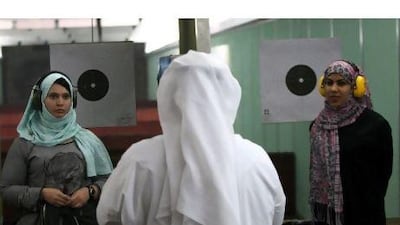SHARJAH // When the final shell hits the ground and the smoke has cleared, someone will walk away with Dh30,000.
At the Sharjah Golf and Shooting Club, 20 of the country's sharpest shooters will be aiming for first prize tonight in the National Day 9mm Shooting Competition 2010.
Over two days last week, 53 mavericks tried their luck in the qualifying rounds. The top 20 made it through to tonight's final. The score to beat was 149 out of 180.
When Baiju Noorudeen, the competition's adjudicator, calls for the finalists to fill their magazines, the bulletproof shooting gallery will, for a minute, fall silent as the competitors load their weapons.
He will call them to attention, then count down from three. After a whistle, the game will be on. The competitors will cock their guns and clear their minds.
Among them will be Zainab Akhlaqi, a 33-year-old officer in the Sharjah Police. "When I see the target, I zone in on it," she said. "I then take a proper aim and put my finger on the trigger."
Holding her breath, she pulls the trigger. The piercing bang of the shot is stifled by earmuffs, but still registers a strong bass thud. The empty brass shell case ricochets off the wall and rolls across the floor.
She releases her breath and takes aim again. Ten seconds or so after the first shot, she fires her second. Under the bright fluorescent lights of the indoor range, she empties her six-shell clip in 90 seconds.
After each clip - each competitor shoots off four in total, including one for practice - the targets are drawn back in and changed.
Col Hassan al Shehhi at Sharjah Police, the head of the jury committee, decides on any close calls - if a hole is on the line between two scoring sections.
"The standard of Sharjah's shooting is high," he says. "Most of the shooters in Sharjah Police first graduated from here."
Last year, the men won the Ministry of Interior's shooting competition, with the women's squad coming in second.
Ms al Akhlaqi was one of two women who qualified last week for tonight's finals. Her colleague and friend, Raja Khalid, missed out by just one point.
Ms Khalid, a 26-year-old emergency nurse trainer in Sharjah Police, remembers the first time she shot a gun, a 9mm SIG Sauer, seven years ago. "I was shaking like hell," she says. "I thought, to myself, what was that?"
Now, she says, she practises all the time. "After the first time, it is really hard to let the feeling it gives you go."
Also, adds Ms al Akhlaqi, letting off a few rounds "is good for stress".
Ms Khalid said the right gun can make all the difference: "Sometimes when you change the gun, it's different. Every gun has its own target. When you change gun you never get a good score, especially when you change it on the day of the competition.
"Sometimes it is just about luck. But a lot of it is up here," she says, tapping her head.

